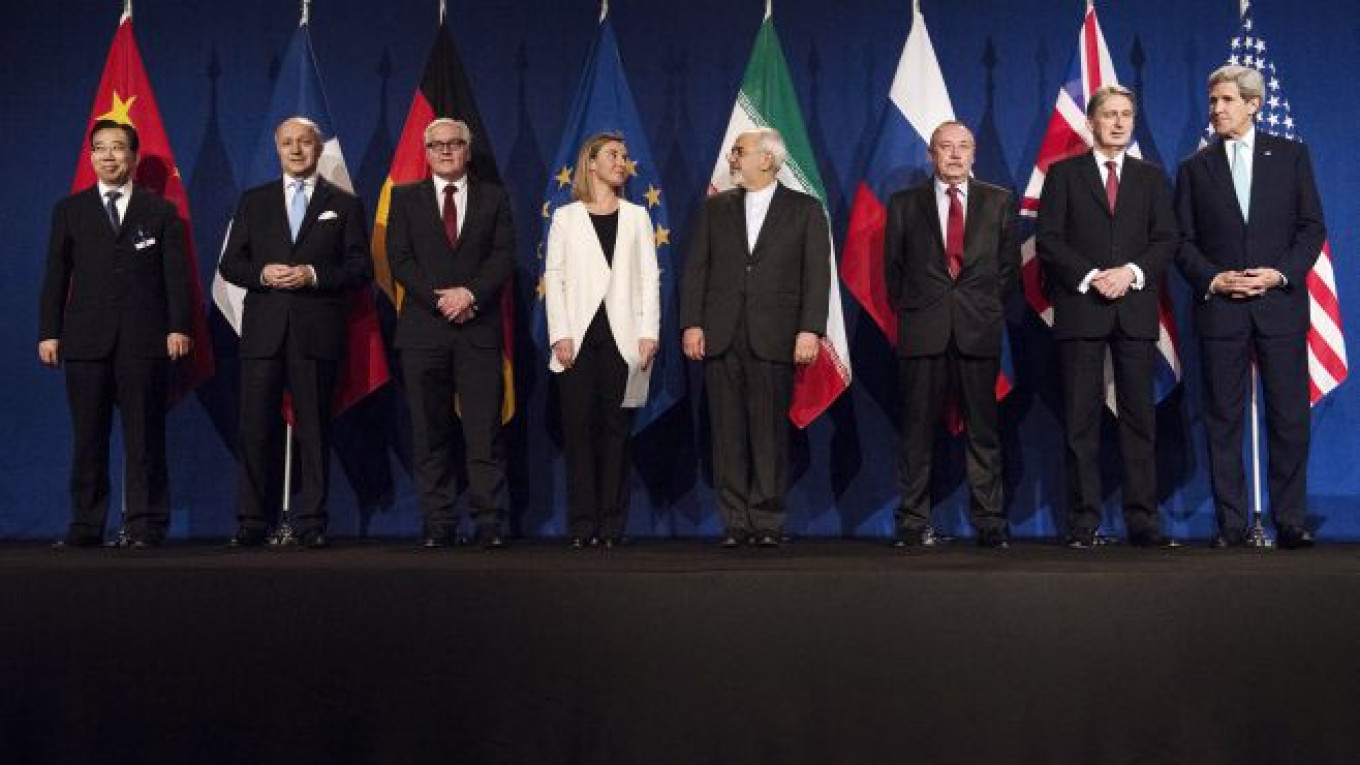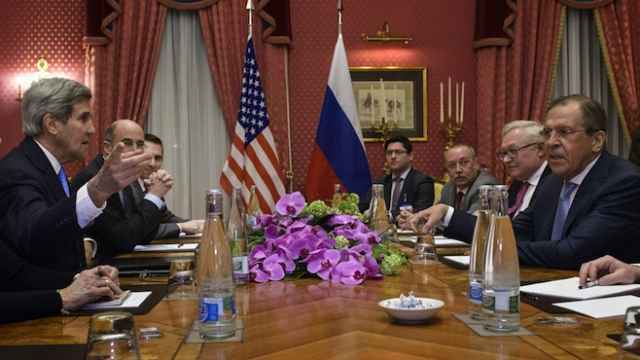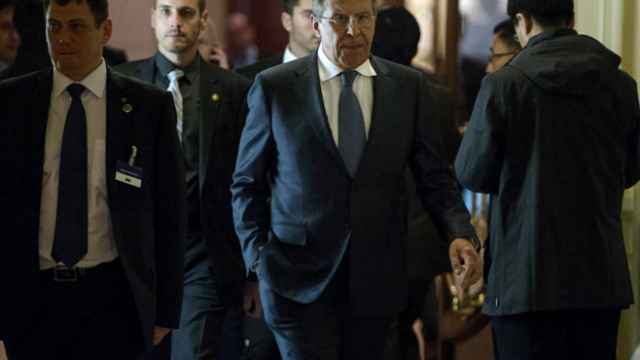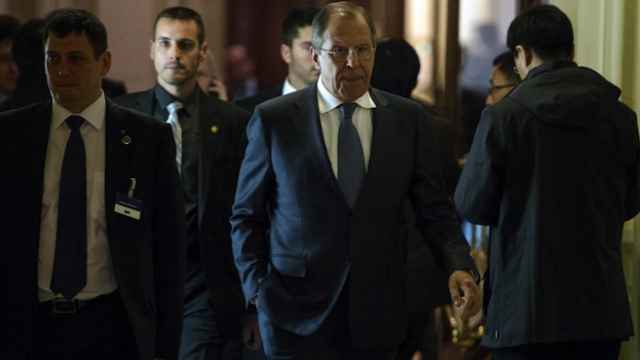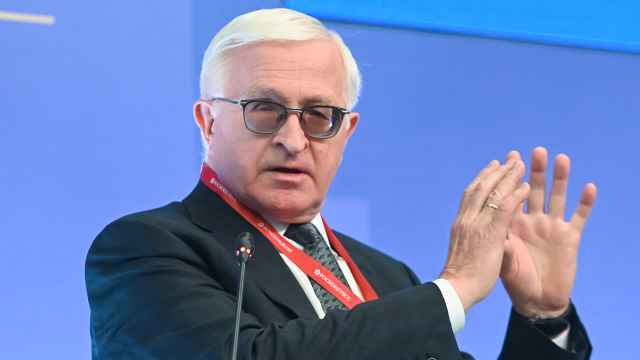The Russian Foreign Ministry said Thursday a deal in Lausanne over Iran's nuclear program would help the security situation in the Middle East, partly because Tehran would now be able to take more active part in efforts to solve conflicts there.
The tentative agreement, after eight days of marathon talks in Switzerland, clears the way for negotiations on a settlement aimed at allaying Western fears that Iran was seeking to build an atomic bomb and in return lift economic sanctions on the Islamic Republic.
The framework is contingent on reaching an agreement by June 30. All sanctions on Iran remain in place until a final deal.
Celebrations erupted in the Iranian capital Tehran. Videos and pictures posted on social media showed cars in Tehran honking horns as passengers clapped. In one video posted on Facebook, a group of women can be heard clapping and chanting "Thank you, Rouhani" in praise of President Hassan Rouhani.
President Barack Obama described the agreement as a "historic understanding with Iran" and compared it to nuclear arms control deals struck by his predecessors with the Soviet Union that "made our world safer" during the Cold War. He also cautioned, however, that "success is not guaranteed."
Many details still need to be worked out. Diplomats close to the negotiations said the deal was fragile. It could not be ruled out that the understandings reached could collapse between now and June 30. Experts believe it will be much harder to reach a final deal than it was to agree the framework accord.
Under the outline deal, Iran would shut more than two-thirds of its installed centrifuges capable of producing uranium that could be used to build a bomb, dismantle a reactor that could produce plutonium, and accept intrusive verification.
The negotiations between Iran and six powers — Britain, China, France, Germany, Russia and the United States — blew past a self-imposed March 31 deadline with no certainty that they would not end in failure.
The Russian Foreign Ministry said Thursday a deal in Lausanne over Iran's nuclear program would help the security situation in the Middle East, partly because Tehran would now be able to take more active part in efforts to solve conflicts there.
The tentative agreement, after eight days of marathon talks in Switzerland, clears the way for negotiations on a settlement aimed at allaying Western fears that Iran was seeking to build an atomic bomb and in return lift economic sanctions on the Islamic Republic.
The framework is contingent on reaching an agreement by June 30. All sanctions on Iran remain in place until a final deal.
Celebrations erupted in the Iranian capital Tehran. Videos and pictures posted on social media showed cars in Tehran honking horns as passengers clapped. In one video posted on Facebook, a group of women can be heard clapping and chanting "Thank you, Rouhani" in praise of President Hassan Rouhani.
President Barack Obama described the agreement as a "historic understanding with Iran" and compared it to nuclear arms control deals struck by his predecessors with the Soviet Union that "made our world safer" during the Cold War. He also cautioned, however, that "success is not guaranteed."
Many details still need to be worked out. Diplomats close to the negotiations said the deal was fragile. It could not be ruled out that the understandings reached could collapse between now and June 30. Experts believe it will be much harder to reach a final deal than it was to agree the framework accord.
Under the outline deal, Iran would shut more than two-thirds of its installed centrifuges capable of producing uranium that could be used to build a bomb, dismantle a reactor that could produce plutonium, and accept intrusive verification.
The negotiations between Iran and six powers — Britain, China, France, Germany, Russia and the United States — blew past a self-imposed March 31 deadline with no certainty that they would not end in failure.
A Message from The Moscow Times:
Dear readers,
We are facing unprecedented challenges. Russia's Prosecutor General's Office has designated The Moscow Times as an "undesirable" organization, criminalizing our work and putting our staff at risk of prosecution. This follows our earlier unjust labeling as a "foreign agent."
These actions are direct attempts to silence independent journalism in Russia. The authorities claim our work "discredits the decisions of the Russian leadership." We see things differently: we strive to provide accurate, unbiased reporting on Russia.
We, the journalists of The Moscow Times, refuse to be silenced. But to continue our work, we need your help.
Your support, no matter how small, makes a world of difference. If you can, please support us monthly starting from just $2. It's quick to set up, and every contribution makes a significant impact.
By supporting The Moscow Times, you're defending open, independent journalism in the face of repression. Thank you for standing with us.
Remind me later.


